Abstract
Precise speed estimation of sensorless induction motor (SIM) drives remains a significant challenge, particularly at zero and very low speeds. This paper proposes a mathematically modeled and enhanced stator current-based Model Reference Adaptive System (MRAS) estimator integrated with correction terms using rotor flux dynamics to continually update the value of the estimated speed to the correct value. The MRAS observer uses the stator current in the adjustable IM model instead of the rotor flux or the back emf to eliminate the effect of pure integration of the rotor flux, the parameters’ deviation, and measurement errors of stator voltages and currents on speed observation. It depends on the observed stator current, the current estimate error, and rotor flux estimation correction terms. A neural network (NN) for the adaptive law of the MRAS observer is proposed to enhance the accuracy of the suggested approach. Simulation results examine the developed method. A laboratory prototype based on DSP-DS1103 was also built, and the experimental results are presented. The SIM drive is examined at zero and very low speeds in motoring and regenerating modes. It exhibits good dynamic performance and low-speed estimation error compared to the conventional MRAS.
Keywords:
sensorless; induction motor; neural network; MRAS observer; stator current-based MRAS; regenerative mode; low-speed estimation MSC:
68T07
1. Introduction
Over the last few years, sensorless induction motor (SIM) drives have been a popular topic. The key benefits of SIM systems over the control strategy with a speed encoder are their low cost and great reliability. Nevertheless, the sensorless system performs poorly at zero and very low speeds [1]. The primary issues with sensorless drives in this region are their susceptibility to changes in machine parameters, mistakes in the acquisition of stator voltage and current, nonlinearity in the inverter, and pure integration of the rotor flux. Moreover, the speed SIM drive system at zero speed is unstable due to unobservability issues of stator currents and voltage variables [1,2].
Numerous ways have been offered to address these issues. These approaches may be classified into two groups. The first approach is based on motor anisotropies. The estimation for speed and rotor flux in this approach was built using artificial saliency, main inductance saturation, rotor slot harmonics, or rotor slot leakage. In [3], a high-frequency signal was injected into a motor. The magnetic saliencies induced by this signal are utilized to determine rotor speed. An approach for identifying disturbances to enhance operation close to zero speed was presented. Motor speed was estimated using the injection of voltage test vectors, as described in [4]. However, to measure zero sequence current, an additional sensor was required. Working at low speeds was improved in [5] by superimposing a low-frequency signal into the stator current and using the reaction of the stator voltage. Excitation-based voltage injection was one of the methods proposed in [6]. To extract the rotor slotting saliency signal, the discrete wavelet transform with Taylor’s expansion was utilized for speed estimation. Both motor anisotropies-based methods provide good speed sensorless performance at low synchronous speed ranges. However, the induction motor’s anisotropies were insufficient to discern rotor speed. Therefore, these approaches, more common in IPMSM drive systems [7,8], are unsuitable for use with speed sensorless IM drive systems in industrial applications.
In the second approach, the IM model is the basis for the observer’s design, which estimates flux and rotor speed. Many strategies have been implemented to boost operations at low speeds. An enhanced torque-MRAS was presented in [9] for precise speed observation in this region. An extended Kalman filter was suggested in [10] to enhance the estimate of torque and speed close to zero speed. One new adaptive sliding mode observer (SMO) with a corrective term was suggested in [11]. The efficiency of speed observation at low speeds was demonstrated by the experimental findings. An innovative predictive MRAS rotor speed estimator is presented in [12]. The precise speed observation at low speed was demonstrated by the results. To enhance the estimation performance at low speeds, an observability index-based technique has been published in [13]. The adaptive flux observer (AFO) method with predicted rotor flux error is proposed in [14]. In the low-speed range, it exhibits superior robustness. The stability problem of the stator current error-based MRAS speed estimator for induction motor drive in the regenerating mode was presented in [15] by introducing an auxiliary variable in the mathematical model of the estimator. In [16], a virtual voltage injection method was introduced to remedy the unstable problem of sensorless induction motor drives (SIMDs) at low synchronous speed range by guaranteeing a stable transfer function of the SSIMD system, and the rotor speed is observable. MRAS-based magnetizing inductance estimator (Lm-MRAS) with the included effect of iron losses and load-dependent saturation was proposed in [17] to enhance the performance of rotor flux-oriented control (RFOC) induction motors. A design of the state observer was proposed in [18] to reduce the unstable low-speed region of the adaptive full-order observer (AFO)-based speed sensorless speed control of induction motors (IMs). The proposed state observer is designed in the z-domain rather than in the s-domain following the pole-placement approach. The convergence rate of the proposed observer can be made faster than that of the IM poles, and the unstable low-speed region of AFO can be reduced to the zero-synchronous-frequency (ZSF) line. Full-order terminal sliding mode (FOTSM) observer is designed for estimating the flux and speed of the motor simultaneously for a sensorless speed control approach of the induction motor (IM) in [19]. In [20], a high-order sliding mode observer (SMO) with adaptive gain for speed sensorless induction motor (IM) drives can improve the robustness of speed estimation. A discrete sliding mode-based MRAS can improve the speed estimation performance of speed sensorless induction motor (IM) drives in [21]. To achieve a balance between estimation accuracy and the chattering problem for sensorless induction motor drive systems at very low and zero speeds, an adaptive gain super-twisting sliding mode observer (AGSTSMO) was proposed in [22]. In [23], the MRAS-Multilayer estimator includes two different MRAS-type estimators, unlike previous multilayer solutions with multiple identical observers, but with different parameters to treat the issue in the regenerating mode operation. An adaptive high-gain observer-based MRAS speed estimator, the performance of sensorless variable-speed IM drives in ultra-low and zero electrical rotor speeds and regeneration mode to obtain acceptable results under unobservable conditions, was proposed in [24]. The wide-speed range stability solution from the perspective of the orthogonality voltage model (VM) in both low-speed range and high-speed range of sensorless induction motor drives was presented in [25]. By studying the observer stability in both continuous-domain and discrete-domain, the observer gains are designed to guarantee the stable operation. A combined reference frame and feedback gains are designed in the z-domain to ensure stability and dynamic performance of AFO to guarantee stability in extremely low-speed regenerating mode compared to a conventional AFO [26]. To remove the DC offset present in the rotor flux derivative, and consequently, the integral drift problem of rotor flux estimation, an SMO-based VM was designed in [27] based on the orthogonality between the rotor flux and its derivative. An auxiliary variable-based MRAS speed observer was designed to overcome the open-loop integrator problem of the conventional rotor flux-based MRAS observer in [28]. To mitigate the issue of rotor flux dynamics and instability at low speeds during regenerating load of the conventional speed adaptive law for AFO, an improved speed adaptive law strategy was proposed by introducing the d-axis current error term in [29].
Recently, artificial intelligence techniques have been employed to develop the workings of speed estimation methods [30,31,32]. They used fuzzy logic controllers (FLCs), neural networks (NNs), genetic algorithms, and particle swarm optimization. Recent works have been presented to have a wide-speed estimation range for sensorless drives [28,33,34,35].
The most popular techniques of MRAS observers are using rotor flux, back emf, reactive power, and stator current as the outcome of the MRAS approach [24,36,37,38]. Drift and starting circumstances are problematic in MRAS approaches that employ the rotor flux (RF) as the output variable because the voltage model (VM) has open integration. As a result, a low-pass filter (LPF) can be employed in place of pure integration; nevertheless, it introduces a time delay and reduces the precision of the low-speed estimates [36]. Back emf-based MRAS uses the back emf as a substitute to get rid of the open integration issues with rotor flux-based MRAS [37]. For this reason, this method does not require LPF, which imposes a bandwidth constraint. At low speeds, however, the fluctuation of the stator resistance—one of the reference model’s most important parameters—can lead to an imprecise calculation of speed. The speed estimate model for the stator current-based MRAS observer has been determined by the motor parameters, stator voltage, and stator current [24,38]. The low-speed performance of sensorless drives may be enhanced with this technology.
The operation at the low and zero speed region in regenerating mode is a challenging point the sensorless drives due to the susceptibility of model-based estimators to changes in machine parameters, mistakes in the acquisition of stator voltage and current, nonlinearity in the inverter, and pure integration of the rotor flux. The effectiveness of any MRAS technique should be evaluated based on how well it can solve these issues, particularly at low and zero speeds. Regretfully, most of these techniques exhibit some deterioration when nearing or even passing zero speed, and most are not tested at zero electrical frequency. Therefore, developing a robust speed estimation method is a difficult task, particularly at zero and very low speeds.
The primary goals of the current paper are as follows:
- ➢
- Considering rotor flux dynamics as correction terms in the estimation process.
- ➢
- Proposing a modified stator current-based MRAS estimator integrated with correction terms using rotor flux dynamics to continually update the value of the estimated speed to the correct value.
- ➢
- Using a neural network (NN) instead of a traditional PI controller for the adaptive law of the MRAS observer to enhance the accuracy of speed estimation.
- ➢
- Examining the developed method using simulation and experimental results at zero and very low speeds in motoring and regenerating modes.
- ➢
- Comparing the proposed NN-based adaptation mechanism for a stator current-based MRAS observer with a traditional PI controller.
2. IM Dynamic Model
Through the stator current and rotor flux, the IM dynamic model is represented as follows [39,40]:
The electromechanical formula of the machine can be obtained using the following:
where the expression for electromagnetic torque is as follows:
where
where is the number of poles, is the magnetizing inductance, is the rotor self-inductance, and are the stator currents along the q- and d-axes, respectively, and and are the rotor flux linkages along the d- and q-axes in the stationary frame. Additionally, the total leakage factor is represented by , is the stator self-inductance, and the rotor time constant is represented by with being the rotor resistance.
The block architecture for the suggested sensorless indirect field-oriented torque control (IFOTC) of IM drives is demonstrated in Figure 1. Using this method, the unit vector which is essential for axis transformation, is found using the measured speed and slip speed as
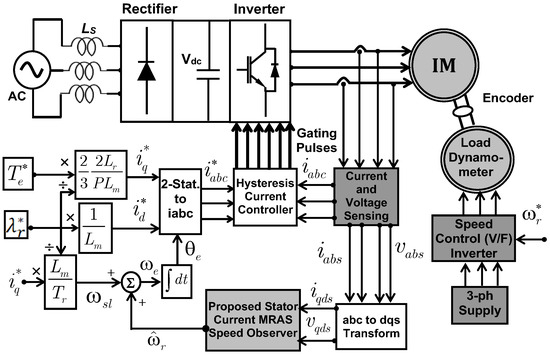
Figure 1.
Block architecture for suggested IFOC sensorless IM drives using stator current-based MRAS observer.
3. Conventional MRAS Observer
The stator current-based MRAS observer for sensorless IM drive is presented as follows:
The stator current is expressed using the rotor flux and motor speed as follows:
Equations (7) and (8), along with the observed speed, allow us to estimate the stator current:
Note that the measured stator voltages and currents can be employed to determine the rotor fluxes, , in Equations (9) and (10).
The stator current difference can be calculated as follows:
where
- is the d-axis stator current error.
- is the q-axis stator current error.
- is the speed estimation error using the conventional method.
- is the estimated speed using the conventional method.
Speed Estimation Law
Using this technique, the following equations are produced by multiplying Equations (11) and (12) by the d-q components of the stator current:
Equations (13) and (14) added together provide the following:
Using Equation (15), the speed error is expressed as follows:
where , .
Subsequently, the estimated speed is provided by the following:
Equation (16) shows how the stator current estimation error and the observed stator current are employed to calculate the speed estimation error. The adaptive law using a PI controller with proper parameters (), as demonstrated by Equation (17), dominates the speed estimation error to zero. This estimate approach, which expresses the stator current error as a function of the speed estimation error’s first degree, enables fast convergence and precise speed estimation. The MRAS observer block arrangement for a sensorless IM drive using IFOTC is depicted in Figure 1. A block schematic of the stator current-based MRAS approach is depicted in Figure 2.
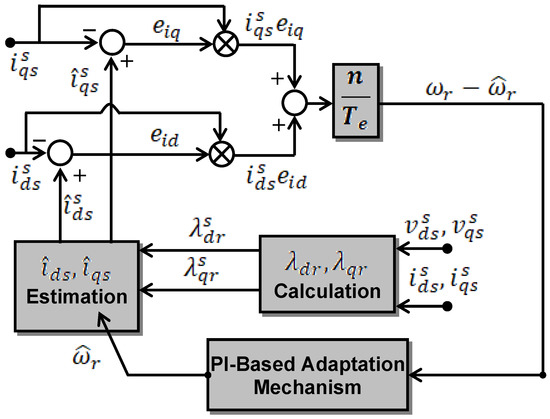
Figure 2.
Construction of stator current-based MRAS speed estimate using PI adaptation mechanism without considering rotor flux dynamics.
In this approach, the flux estimation is not used directly in the speed equation. However, Equation (16), which is derived from the rotor flux and stator current, provides the speed estimation error. Its imprecise estimation at zero and very low speeds is the main problem with the conventional stator current-based MRAS speed observer. The reference and adjustable models of the stator current-based MRAS speed observer depend on the rotor flux dynamics. A voltage model flux observer can be applied since the rotor flux estimate is important for the stator current MRAS technique as indicated in Equations (9) and (10). The rotor flux estimate derived from VM was utilized. The main drawbacks of the voltage model (VM) are exact stator voltage and current collection, DC drift when utilizing pure integration, and the susceptibility to changes in machine parameters. Using the CM can also help prevent these problems. Equations (7) and (8) illustrate how this model produces the rotor flux components concerning stator current components and rotor speed. Because rotor flux estimation with a CM depends on the estimated speed, any decrease in speed estimation feeds back to the flux observer, creating instability in the low-speed zone. Rotor flux estimate deterioration has a detrimental effect on stator current tracking and causes instability in speed estimation using the CM flux observer. Therefore, rotor flux dynamics presents a big challenge for precise speed estimation, and consequently, the performance of the sensorless control of IM drives, particularly at very low and zero speeds in the regenerating mode of operation.
4. Stator Current-Based MRAS Observer with Rotor Flux Correction Terms
In this method, the rotor flux dynamics are considered as correction terms for the estimated stator current to continually update the value of the estimated speed to the correct value. The estimated stator currents using the observed speed and the rotor flux error dynamics are described in (18) and (19).
The two components, and , are the correction terms of the rotor flux estimation in d-q axes to consider the error dynamics of the rotor fluxes. These terms are essential to continually update and correct the estimated stator currents, particularly in the low-speed region, to obtain a precise estimate of the stator currents (, ), and consequently, the estimated speed.
The stator current difference can be calculated as follows:
where
- is the speed estimation error using a modified method.
- is the estimated speed using a modified method.
Using this technique, the following equations are produced by multiplying Equations (20) and (21) by the d-q components of the stator current:
Equations (22) and (23) added together provide the following:
Using Equation (24), the speed error is expressed as follows:
Subsequently, the estimated speed is provided by the following:
Figure 3 depicts the structural representation of the proposed speed estimator of a stator current-based MRAS with correction terms of rotor flux error dynamics that use PI as an adaptive law. To obtain the estimated speed quantity, the PI controller is employed to reduce the speed estimation error.
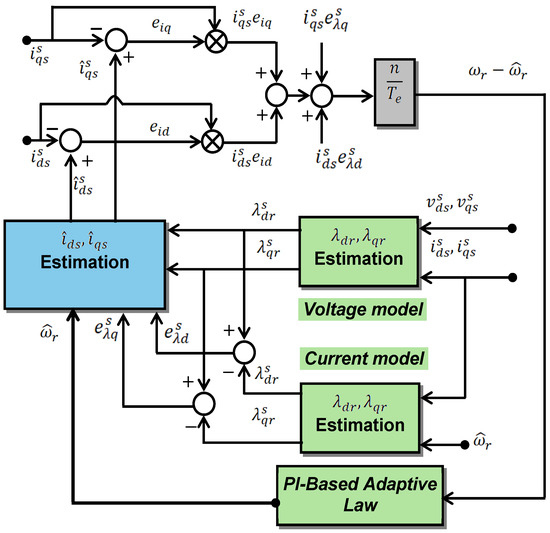
Figure 3.
Structure of proposed speed estimation using PI-based adaptive law and rotor flux error dynamics.
To overcome the sensitivity to variations in machine parameters, stator voltages, and current acquisition errors—which are considered the main drawbacks associated with the voltage model—the developed speed estimation scheme is then realized by substituting the measured stator current instead of the rotor flux and employing NN as an adaptation mechanism in place of the traditional PI one, establishing a neural network-based MRAS estimator.
Artificial intelligence (AI) has been used to identify and control nonlinear dynamic systems, as AI can accurately estimate a large variety of nonlinear functions to any required degree of precision. Their immunity to input harmonic ripples and robustness to parameter changes is further advantages. Several recent studies have examined the use of AI to power electronics and AC drives, including speed estimation. A neural network (NN) can be used to predict motor speed using rotor flux error dynamics.
The speed estimation algorithm in Equations (25) and (26) that employs the MRAS mechanism is seen as an optimization issue. In this work, the NN, as one of the artificial intelligence techniques, can be used to solve the optimization difficulty in place of the traditional PI controller-based adaptation mechanism. One nonlinear adaptive control method that has been proven to work well with systems that have uncertain or unknown parameters and structural alterations is the NN. These systems can also be imprecise, nonlinear, or time-varying. In contrast to constant gain PI controllers, NN does not require exact mathematical modeling or parameters.
The suggested speed estimator for an induction motor that employs NN as an adaptive law is shown structurally in Figure 4 instead of using the conventional PI one. The reference model is defined as the voltage equations that do not include , as described in Equations (7) and (8). The adjustable model is defined as the current equations that involve , as introduced in Equations (18) and (19). The estimated speed , which is the result of the NN-based adaptive law, is what is utilized as the input of the adjustable model. An error arises between the flux from the reference model () and the flux from the adjustable model () if the predicted speed differs from the true speed, which is used as a correction term. The mistake is then backpropagated to the NN, and the NN’s weights are changed online to minimize the error. In the end, the NN’s output corresponds to the actual speed. Employing the backpropagation NN technique, the NN is trained with the estimated rotor angle as the output and the stator currents and their rotor flux errors as inputs. Finite element analysis (FEA) provided the data needed for the initial NN training.
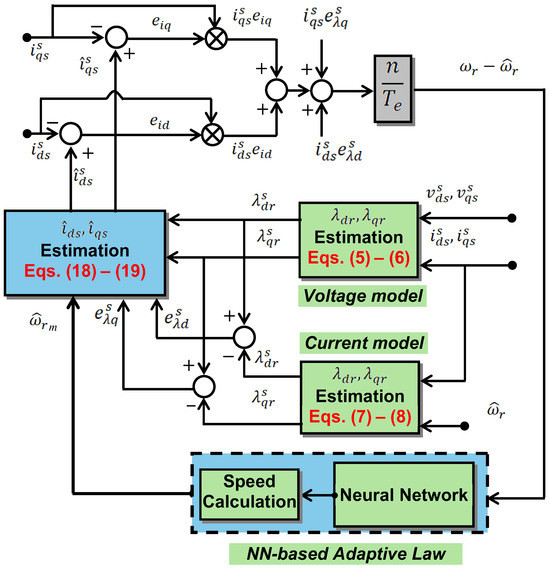
Figure 4.
Structure of proposed speed estimation using an artificial neural network-based adaptation mechanism. Voltage model Equations (5) and (6), current model Equations (7) and (8), stator current estimation Equations (18) and (19), and speed estimation Equations (20)–(26).
A three-layer feedforward neural network is selected to estimate rotor speed from stator current and rotor flux inputs. This architecture provides a good balance between learning capacity and computational efficiency. Given the nonlinear relationship between these electrical quantities and rotor speed, a model with sufficient depth was necessary to capture the underlying dynamics accurately. The choice of two hidden layers (i.e., a three-layer network including input, hidden, and output layers) was motivated by prior literature showing successful use of similar structures in electrical machine control tasks. Preliminary experiments comparing simpler models (e.g., linear regression, single-layer NN) failed to capture nonlinear dependencies adequately. Avoidance of overfitting and excessive training time is observed with deeper networks. Thus, the three-layer NN provided an effective trade-off, enabling high estimation accuracy while maintaining real-time applicability.
The reported results are based on a hyperparameter-optimized neural network. A grid search was conducted to tune key hyperparameters, including the learning rate, number of hidden neurons, activation functions, batch size, and optimizer choice. Model performance was evaluated using cross-validation on the training data to ensure generalization. Additionally, early stopping was employed to prevent overfitting by monitoring validation loss. The hyperparameter configuration that yielded the best validation performance was selected for final model evaluation. Table 1 shows a summary of hyperparameter tuning for the neural network.

Table 1.
Summary of hyperparameter tuning for neural network.
In Figure 5, the NN is represented by three layers. Three neurons make up the input layer, six neurons make up the hidden layer, and one neuron makes up the output layer. A squared error of 4.9 × 10−3 is trained into the NN across 100 epochs. The Digital Signal Processor (DSP) must process this NN in 70 operations and 31 μs. The NN is implemented, and the input is the stator current vector () and the rotor flux vector (). The NN uses these variables to estimate the rotor position, and consequently, the rotor speed. Stator current vector (), rotor flux vector (), and the NN output are the estimated rotor speed.
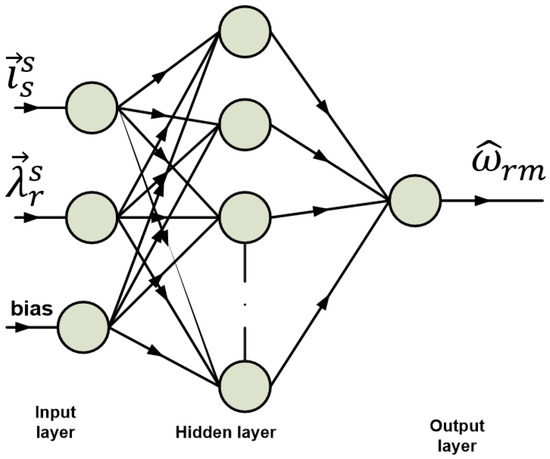
Figure 5.
NN structure using stator current vector (), rotor flux vector (), and NN output are estimated rotor speed.
Figure 6 shows the rotor flux angle at 7.5 rpm and step load variation from zero to 90% rated load at 5.5 s. The upper graph demonstrates the reference (model-based technique) and estimated rotor flux (NN-based technique) angles in black and red colors, respectively. In the lower graph, the deviation between this reference and estimated rotor flux angles can be seen. This figure proves the precise rotor flux angle estimation in comparison to the reference one, and the good tracking of the rotor angle throughout steady state and transient operations.
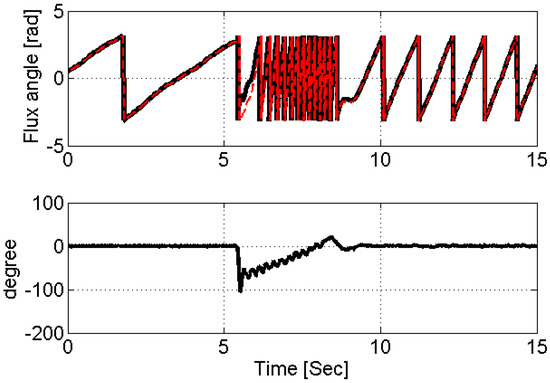
Figure 6.
Reference (model-based) in black color and estimated rotor flux (NN-based) angles in rad in red color, and error between reference and estimated rotor flux angles in degrees at speed of 7.5 rpm and step load change from zero to 90% rated load at 5.5 s.
5. Instability of Speed Sensorless IM Drives in the Regenerating Mode
To illustrate the instability of speed sensorless IM drives in the regenerating mode at very low speeds, Figure 7 presents the simulation results of the rotor speed estimation performance at 20 rpm with TL variation from 0 to negative full load at instant t = 4 s. The conventional MRAS speed estimator is used. It is obvious that the speed estimation is unstable, and a large speed error occurs, as shown in Figure 7a. The actual and estimated speeds are divergent. However, the estimated speed tracks the actual one smoothly using the proposed stator current-based MRAS observer with NN in the adaptation mechanism, as shown in Figure 7b. The estimated speed converges to the actual value. The flux orientation of the two observers is also compared, as displayed in Figure 8. The flux orientation is preserved with the new MRAS observer, but with the traditional MRAS observer, it is lost.
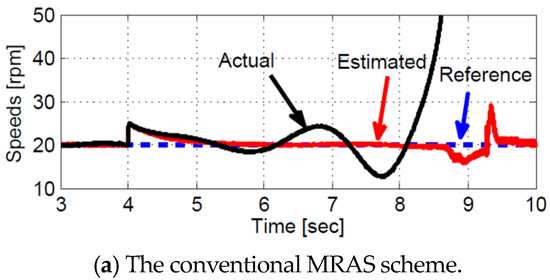
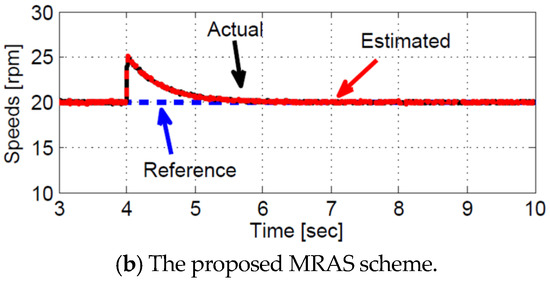
Figure 7.
Simulation results showing rotor speed estimation performance at 20 rpm with TL variation from 0 to negative full load at instant t = 4 s.
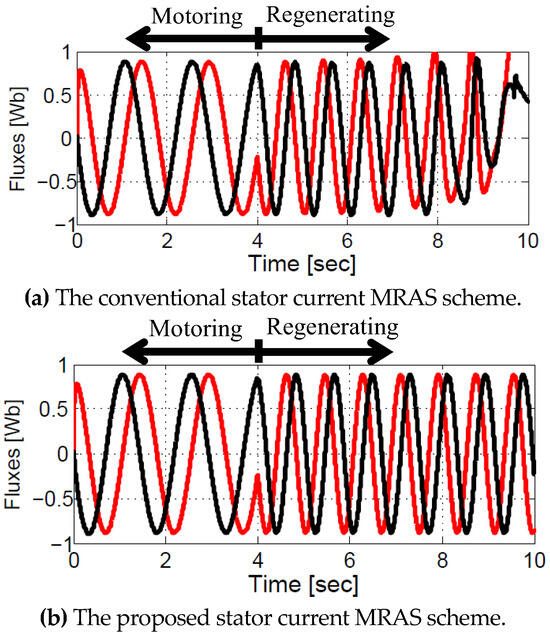
Figure 8.
Simulation results showing rotor flux estimation performance at 20 rpm and load torque change TL = ±5 N m when t = 4 s. (alpha and beta component represented in black and red color respectively).
6. Laboratory System Implementation
Using a dSPACE DSP-DS1103 control board and a laboratory 5.5 kW IM, the suggested sensorless IM drive, with parameters shown in Appendix A, with NN in the adaptation mechanism and a novel stator current-based MRAS observer was experimentally realized in real-time (Figure 9). The machine for examination was run in sensorless torque-controlled mode. The speed-controlled load dynamometer sets the driving speed. Six IGBTs and a gate driver board comprise a three-phase voltage-source pulse-width-modulation (PWM) inverter that supplies the IM.
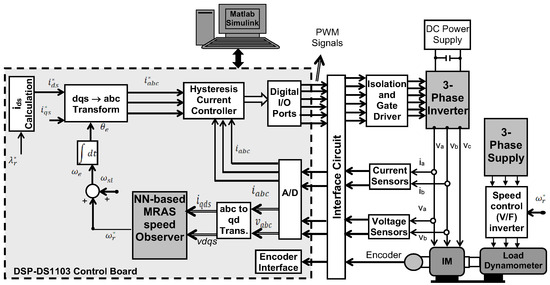
Figure 9.
A schematic representation of the DSP-DS1103 control board-based experimental sensorless IFOTC system for an IM drive.
For a fair performance comparison, experimental tests are provided under the same conditions as the simulation results to validate the simulation results and the effectiveness of the suggested adaptation stator current-based MRAS observer with NN in the adaptation mechanism. The sensorless IM drive with IFOTC is used for obtaining these tests. According to the experimental results, the IM was torque-controlled using conventional dq current loops, and the rotor-oriented dq frame’s vector transformation was carried out using the estimated rotor flux angle. A speed-controlled load dynamometer with a speed monitor was attached to the driving system.
6.1. Speed Reversal at Very Low Speed
The simulation and experimental results for the performance of the sensorless IM drive during very low-speed reversals are shown in Figure 10 using the proposed modified stator current-based MRAS speed observer with FLC. The IM was operated at rated load conditions. The reference speed was suddenly changed from −20 rpm to 20 rpm, then back to −20 rpm, and finally changed to 20 rpm.
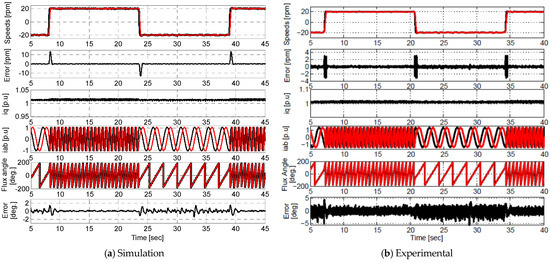
Figure 10.
Simulation and experimental results of sensorless IM drive using proposed modified MRAS observer at very low-speed reversal, ±20 rpm at rated load. 1st: Reference speed (black), estimated speed (red); 2nd: speed estimation error (rpm); 3rd: load torque current (p.u); 4th: iab (p.u); 5th: reference flux angle (black), and estimated flux angle (red); 6th: flux angle error (deg.).
In the simulation results of Figure 10a, the sensorless drive operates first in the regenerating mode (0 → 8 s), then in the motoring mode (8 → 23 s), again in the regenerating mode (t = 23 → 38 s), and finally in the motoring mode (t = 38 → 45 s). Alternatively, in the experimental results of Figure 10b, the sensorless drive operates first in the regenerating mode (0 → 7 s), then in the motoring mode (7 → 21 s), again in the regenerating mode (t = 21→34 s), and finally in the motoring mode (t = 34 → 40 s), as shown in Figure 10. It was observed that the sensorless drive with the proposed MRAS observer shows a significant performance with excellent estimation accuracy during very low-speed reversals in the motoring and regenerating modes of operation, where the speed estimation error is approximately 3 rpm and dies out soon after the transient periods. Also, the estimated rotor flux angle tracks the reference one with a small error, as shown in the fifth and sixth graphs of Figure 10.
6.2. Sudden Load Disturbances at Zero Speed
The simulation and experimental results showing the zero speed operation with applying and removing the rated load torque are also presented, as depicted in Figure 11. The reference speed was set to zero. At t = 12 s, a rated load torque step was added, and at t = 32 s, it was withdrawn. As can be seen, there is high agreement between the measured and estimated speeds since the estimated speed immediately recovers from the impact of the load and follows the measured speed. The predicted signals can follow the measured ones in both transient and steady states. During transient operation, a significant decrease in the speed estimation error to zero is seen. The suggested stator current-based MRAS speed observer with NN functions as intended, particularly when there are abrupt load disturbances, and the driving mode is operating at zero speeds. The rotor flux angle, current, and speed are all accurately monitored. The fifth and sixth graphs of Figure 11 show that the rotor flux angle reflects the angle of the MRAS approach with only a small amount of inaccuracy. There is just a small degree of discrepancy between the estimated and reference flux angles. This suggests that the sensorless IM drives’ speed control functions effectively as well.
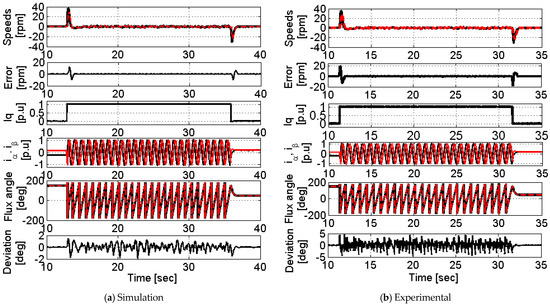
Figure 11.
The sensorless IM drive’s simulation and experimental results when the rated load torque was applied suddenly and removed at zero speed, reference in black and estimated in red color.
6.3. Zero Stator Frequency, Plugging, and Regenerative Operations
Modern observers find it difficult to maintain the zero stator frequency condition under the rated torque. The sensorless IM drive’s modeling and experimental results are displayed in Figure 12, showing the speed change from zero rpm to −15 rpm under rated load, which corresponds to the plugging mode of operation, along with the speed changed from −15 rpm to −37.5 rpm at time instant 5 s, as well as the speed change from −37.5 rpm to −58 rpm, which corresponds to the regenerative mode of operation. At −37.5 rpm, according to this load state, the drive is running at almost zero stator frequency. The outcome is zero stator frequency since this speed is equal to the slip angular frequency at that load level. It is found that the high accuracy of the speed estimation algorithm is observed.
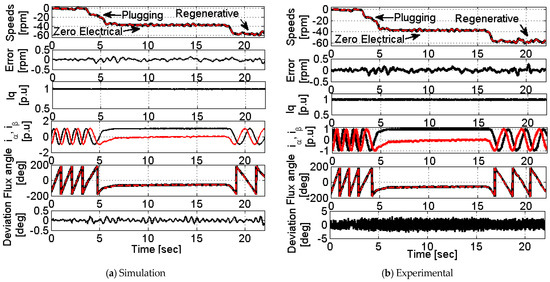
Figure 12.
The sensorless IM drive’s simulation and experimental results at step speed change (0 → −15→ −37.5 → −58 rpm) at rated load condition, reference in black and estimated in red color.
7. Comparison of Conventional and Proposed MRAS Observers
A comparison of the conventional and proposed MRAS observers is demonstrated as shown in Figure 13. It is evident that the proposed MRAS observer using NN-adaptive law guarantees good estimation during the transient state. The speed estimation error using the modified MRAS observer is lower than the conventional method and takes a low settling time to steady state.
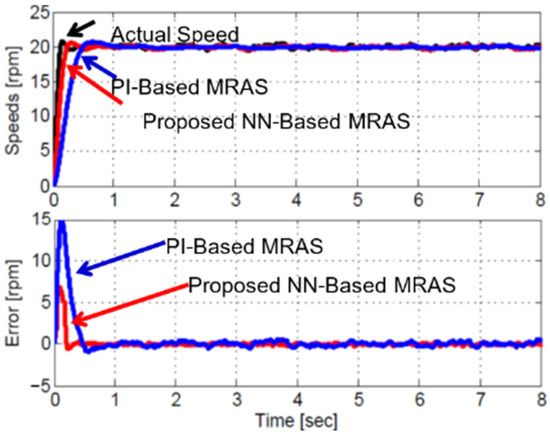
Figure 13.
The experimental results showing the performance comparison between the proposed NN-based MRAS and the conventional PI-based MRAS in the adaptation mechanism during starting operation.
In Figure 14, the upper diagram shows the rotor flux angles of the proposed NN-based MRAS (red), PI-based MRAS (blue), and the reference (black) at speed change ±37.5 rpm at full load. The deviation between the reference rotor flux angle with the proposed NN-based MRAS (red) and that of the PI-based MRAS (blue) is depicted in the lower diagram of Figure 13. It is noticed that from the deviation waveforms, the flux estimation error using the proposed MRAS observer is lower than the PI-based MRAS method.
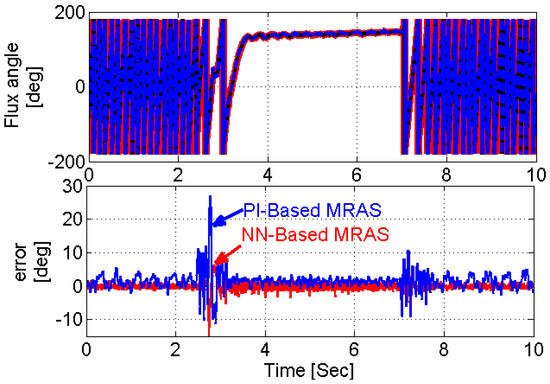
Figure 14.
Upper: The experimental results showing the performance comparison among the proposed NN-based MRAS (red), the conventional PI-based MRAS (blue), and the reference (black) flux angles at speed change ±37.5 rpm with full load. Lower: The deviation among the reference, proposed (red), and conventional (blue) rotor flux angles.
8. Conclusions
In this paper, a modified stator current-based MRAS speed observer using rotor flux dynamics was proposed. The correction terms of the rotor flux continually update the estimated speed. The NN-based adaptation mechanism of the proposed MRAS observer was employed instead of the traditional PI controller. The NN adaptation mechanism guarantees good performance compared with the traditional PI-based adaptation mechanism during transient and steady states. The sensorless IM drive using the proposed MRAS observer was found to be precise at very low and zero speeds during operation in the motoring and regenerating modes. Also, it works well under the performance at zero electrical frequency. Simulation and experimental results prove the efficacy of the proposed stator current-based MRAS observer using the NN in the adaptation mechanism.
The neural network controllers offer high flexibility and can handle complex, nonlinear systems well. They are powerful but not always reliable unless properly designed and trained, as presented in the proposed method. However, like any technique, they come with limitations such as training complexity and time. The controller’s performance is heavily dependent on the quality and variety of training data.
Author Contributions
Conceptualization, M.S.Z.; methodology, M.K.M.; software, M.S.Z. and M.K.M.; validation, M.S.Z. and M.K.M.; investigation, K.B.T.; writing—original draft preparation, M.S.Z. and M.K.M.; writing—review and editing, K.B.T.; visualization, M.S.Z., M.K.M. and K.B.T. All authors have read and agreed to the published version of the manuscript.
Funding
This work was funded by the Deanship of Scientific Research at Northern Border University, Arar, KSA, under the project number NBU-FFR-2025-1250-05.
Data Availability Statement
The original contributions presented in the study are included in the article.
Acknowledgments
The authors extend their appreciation to the Deanship of Scientific Research at Northern Border University, Arar, KSA, for supporting this research work through the project number “NBU-FFR-2025-1250-05”.
Conflicts of Interest
The authors declare no conflicts of interest.
Appendix A

Table A1.
Parameters of IM.
Table A1.
Parameters of IM.
| Parameter | Value | Parameter | Value |
|---|---|---|---|
| Rated power | 5.5 kW | Ls | 57.3 mH |
| No. of pole pairs (p) | 2 | Lr | 57.3 mH |
| Stator resistance (Rs) | 0.294 Ω | Lm | 56.43 mH |
| Rotor resistance (Rr) | 0.14325 Ω | Rated voltage | 186 V |
| Supply frequency | 50 Hz |
References
- Holtz, J. Sensorless control of induction motor drives. Proc. IEEE 2002, 90, 1359–1394. [Google Scholar] [CrossRef]
- Holtz, J. Sensorless Control of Induction Machines—With or Without Signal Injection? IEEE Trans. Ind. Electron. 2006, 53, 7–30. [Google Scholar] [CrossRef]
- Gao, Q.; Asher, G.M.; Sumner, M. Sensorless Position and Speed Control of Induction Motors Using High Frequency Injection and Without Offline Pre-Commissioning. IEEE Trans. Ind. Electron. 2007, 54, 2474–2481. [Google Scholar]
- Staines, C.S.; Caruana, C.; Asher, G.M.; Sumner, M. Sensorless Control of Induction Machines at Zero and Low Frequency Using Zero Sequence Currents. IEEE Trans. Ind. Electron. 2006, 53, 195–206. [Google Scholar] [CrossRef]
- Hinkkanen, M.; Leppänen, V.-M.; Luomi, J. Flux Observer Enhanced with Low-Frequency Signal Injection Allowing Sensorless Zero-Frequency Operation of Induction Motors. IEEE Trans. Ind. Appl. 2005, 41, 52–59. [Google Scholar] [CrossRef]
- Metwaly, M.K.; Elkalashy, N.I.; Zaky, M.S.; Wolbank, T.M. Slotting Saliency Extraction for Sensorless Torque Control of Standard Induction Machines. IEEE Trans. Energy Convers. 2018, 33, 68–77. [Google Scholar] [CrossRef]
- Ni, R.; Xu, D.; Blaabjerg, F.; Lu, K.; Wang, G.; Zhang, G. Square-Wave Voltage Injection Algorithm for PMSM Position Sensorless Control with High Robustness to Voltage Errors. IEEE Trans. Power Electron. 2017, 32, 5425–5437. [Google Scholar] [CrossRef]
- Smith, A.N.; Gadoue, S.M.; Finch, J.W. Improved Rotor Flux Estimation at Low Speeds for Torque MRAS-Based Sensorless Induction Motor Drives. IEEE Trans. Energy Convers. 2016, 31, 270–282. [Google Scholar] [CrossRef]
- Alsofyani, I.M.; Idris, N.R.N. Simple Flux Regulation for Improving State Estimation at Very Low and Zero Speed of a Speed Sensorless Direct Torque Control of an Induction Motor. IEEE Trans. Power Electron. 2016, 31, 3027–3035. [Google Scholar] [CrossRef]
- Zaky, M.S.; Metwaly, M.K.; Azazi, H.Z.; Deraz, S.A. A New Adaptive SMO for Speed Estimation of Sensorless Induction Motor Drives at Zero and Very Low Frequencies. IEEE Trans. Ind. Electron. 2018, 65, 6901–6911. [Google Scholar] [CrossRef]
- Zbede, Y.B.; Gadoue, S.M.; Atkinson, D.J. Model Predictive MRAS Estimator for Sensorless Induction Motor Drives. IEEE Trans. Ind. Electron. 2016, 63, 3511–3521. [Google Scholar] [CrossRef]
- Lefebvre, G.; Gauthier, J.-Y.; Hijazi, A.; Lin-Shi, X.; Le Digarcher, V. Observability-Index-Based Control Strategy for Induction Machine Sensorless Drive at Low Speed. IEEE Trans. Ind. Electron. 2017, 64, 1929–1938. [Google Scholar] [CrossRef]
- Sun, W.; Yu, Y.; Wang, G.; Li, B.; Xu, D. Design Method of Adaptive Full Order Observer with or without Estimated Flux Error in Speed Estimation Algorithm. IEEE Trans. Power Electron. 2016, 31, 2609–2626. [Google Scholar] [CrossRef]
- Kumar, R.; Das, S.; Syam, P.; Chattopadhyay, A.K. Review on Model Reference Adaptive System for Sensorless Vector Control of Induction Motor Drives. IET Electr. Power Appl. 2015, 9, 496–511. [Google Scholar] [CrossRef]
- Korzonek, M.; Tarchala, G.; Orlowska-Kowalska, T. Simple Stability Enhancement Method for Stator Current Error-Based MRAS-Type Speed Estimator for Induction Motor. IEEE Trans. Ind. Electron. 2020, 67, 5854–5866. [Google Scholar] [CrossRef]
- Sun, W.; Wang, Z.; Xu, D.; Wang, B. Robust Stability Improvement for Speed Sensorless Induction Motor Drive at Low Speed Range by Virtual Voltage Injection. IEEE Trans. Ind. Electron. 2020, 67, 2642–2654. [Google Scholar] [CrossRef]
- Lipcak, O.; Bauer, J. MRAS-Based Induction Machine Magnetizing Inductance Estimator with Included Effect of Iron Losses and Load. IEEE Access 2021, 9, 166234–166248. [Google Scholar] [CrossRef]
- Nguyen, N.-D.; Nam, N.N.; Yoon, C.; Lee, Y.I. Speed Sensorless Model Predictive Torque Control of Induction Motors Using a Modified Adaptive Full-Order Observer. IEEE Trans. Ind. Electron. 2022, 69, 6162–6172. [Google Scholar] [CrossRef]
- Zhou, M.; Cheng, S.; Feng, Y.; Xu, W.; Wang, L.; Cai, W. Full-Order Terminal Sliding-Mode-Based Sensorless Control of Induction Motor with Gain Adaptation. IEEE J. Emerg. Sel. Top. Power Electron. 2022, 10, 1978–1991. [Google Scholar] [CrossRef]
- Wang, T.; Wang, B.; Yu, Y.; Xu, D. High-Order Sliding-Mode Observer with Adaptive Gain for Sensorless Induction Motor Drives in the Wide-Speed Range. IEEE Trans. Ind. Electron. 2023, 70, 11055–11066. [Google Scholar] [CrossRef]
- Wang, T.; Wang, B.; Yu, Y.; Xu, D. Discrete Sliding-Mode-Based MRAS for Speed-Sensorless Induction Motor Drives in the High-Speed Range. IEEE Trans. Power Electron. 2023, 38, 5777–5790. [Google Scholar] [CrossRef]
- Nurettin, A.; İnanç, N. Sensorless Vector Control for Induction Motor Drive at Very Low and Zero Speeds Based on an Adaptive-Gain Super-Twisting Sliding Mode Observer. IEEE J. Emerg. Sel. Top. Power Electron. 2023, 11, 4332–4339. [Google Scholar] [CrossRef]
- Wróbel, K.; Tarchała, G.; Szabat, K.; Katsura, S. Improving Regenerating Mode Operation of MRAS-Based Induction Motor Speed Estimation Using the Multilayer Technique. IEEE Access 2024, 12, 153063–153073. [Google Scholar] [CrossRef]
- Tir, Z.; Orlowska-Kowalska, T.; Ahmed, H.; Houari, A. Adaptive High Gain Observer Based MRAS for Sensorless Induction Motor Drives. IEEE Trans. Ind. Electron. 2024, 71, 271–281. [Google Scholar] [CrossRef]
- Wang, T.; Yu, Y.; Wang, B.; Xu, D. Wide-Speed Range Stability Improvement of Speed-Sensorless Induction Motor Drives Based on Orthogonality Voltage-Model Observer. IEEE Trans. Power Electron. 2024, 39, 16521–16539. [Google Scholar] [CrossRef]
- Chen, H.; Li, J.; Lu, Y.; Yang, K.; Wu, L.; Liu, Z. Stability Improvement of Adaptive Full-Order Observer for Sensorless Induction Motor Drives in Low-Speed Regenerating Mode. IEEE Trans. Transp. Electrif. 2024, 10, 8–18. [Google Scholar] [CrossRef]
- Wang, T.; Wang, B.; Yu, Y.; Xu, D. A Closed-Loop Voltage Model Observer for Sensorless Induction Motor Drives Based on the Orthogonality and Sliding-Mode Technique. IEEE Trans. Ind. Electron. 2024, 71, 13693–13707. [Google Scholar] [CrossRef]
- Wang, T.; Yu, Y.; Zhang, Z.; Jin, S.; Wang, B.; Xu, D. An Auxiliary Variable-Based MRAS Speed Observer for Stable Wide-Speed Operation in Sensorless Induction Motor Drives. IEEE J. Emerg. Sel. Top. Power Electron. 2024, 12, 4926–4940. [Google Scholar] [CrossRef]
- Wang, B.; Huang, X.; Du, P.; Xu, D. Speed-Adaptive Observer Design for Sensorless Induction Motor Drives in Ultra-Low Speed Region with Graphical Method. IEEE Trans. Ind. Electron. 2024, 1–11. [Google Scholar] [CrossRef]
- Gadoue, S.M.; Giaouris, D.; Finch, J.W. Stator Current Model Reference Adaptive Systems Speed Estimator for Regenerating-Mode Low-Speed Operation of Sensorless Induction Motor Drives. IET Electr. Power Appl. 2013, 7, 597–606. [Google Scholar] [CrossRef]
- Maiti, S.; Verma, V.; Chakraborty, C.; Hori, Y. An Adaptive Speed Sensorless Induction Motor Drive with Artificial Neural Network for Stability Enhancement. IEEE Trans. Ind. Inform. 2012, 8, 757–766. [Google Scholar] [CrossRef]
- Cirrincione, M.; Accetta, A.; Pucci, M.; Vitale, G. MRAS Speed Observer for High Performance Linear Induction Motor Drives Based on Linear Neural Networks. IEEE Trans. Power Electron. 2013, 28, 123–134. [Google Scholar] [CrossRef]
- Benlaloui, I.; Drid, S.; Chrifi-Alaoui, L.; Ouriagli, M. Implementation of a New MRAS Speed Sensorless Vector Control of Induction Machine. IEEE Trans. Energy Convers. 2015, 30, 588–595. [Google Scholar] [CrossRef]
- Zaky, M.S.; Shaaban, S.M.; Fetouh, T.; Azazi, H.Z.; Mesalam, Y.I. Optimization of Observer Feedback Gains for Stable Sensorless IM Drives at Very Low Frequencies: A Comparative Study Between GA and PSO. Mathematics 2022, 10, 1710. [Google Scholar] [CrossRef]
- Abdullah, Q.; Farah, N.; Ahmed, M.S.; Shah, N.S.M.; Aydoğdu, Ö.; Talib, M.H.N.; Al-Moliki, Y.M.; Uğurenver, A.; Al-Mekhalfi, M.A.A.; Aihsan, M.Z.; et al. Sensorless Speed Control of Induction Motor Drives Using Reinforcement Learning and Self-Tuning Simplified Fuzzy Logic Controller. IEEE Access 2024, 12, 136485–136501. [Google Scholar] [CrossRef]
- Rashed, M.; Stronach, A.F. A Stable Back-EMF MRAS-Based Sensorless Low Speed Induction Motor Drive Insensitive to Stator Resistance Variation. IEE Proc. Electr. Power Appl. 2004, 151, 685–693. [Google Scholar] [CrossRef]
- Maiti, S.; Chakraborty, C. A New Instantaneous Reactive Power Based MRAS for Sensorless Induction Motor Drive. Simul. Model. Pract. Theory 2010, 18, 1314–1326. [Google Scholar] [CrossRef]
- Orlowska-Kowalska, T.; Korzonek, M.; Tarchala, G. Performance Analysis of Speed-Sensorless Induction Motor Drive Using Discrete Current-Error Based MRAS Estimators. Energies 2020, 13, 2595. [Google Scholar] [CrossRef]
- Zaky, M.S.; Metwaly, M.K. Sensorless Torque/Speed Control of Induction Motor Drives at Zero and Low Frequencies with Stator and Rotor Resistance Estimations. IEEE J. Emerg. Sel. Top. Power Electron. 2016, 4, 1416–1429. [Google Scholar] [CrossRef]
- Maksoud, H.A.; Shaaban, S.M.; Zaky, M.S.; Azazi, H.Z. Performance and Stability Improvement of AFO for Sensorless IM Drives in Low Speeds Regenerating Mode. IEEE Trans. Power Electron. 2019, 34, 7812–7825. [Google Scholar] [CrossRef]
Disclaimer/Publisher’s Note: The statements, opinions and data contained in all publications are solely those of the individual author(s) and contributor(s) and not of MDPI and/or the editor(s). MDPI and/or the editor(s) disclaim responsibility for any injury to people or property resulting from any ideas, methods, instructions or products referred to in the content. |
© 2025 by the authors. Licensee MDPI, Basel, Switzerland. This article is an open access article distributed under the terms and conditions of the Creative Commons Attribution (CC BY) license (https://creativecommons.org/licenses/by/4.0/).